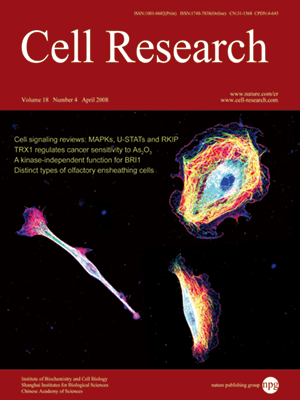
Volume 18, No 4, Apr 2008
ISSN: 1001-0602
EISSN: 1748-7838 2018
impact factor 17.848*
(Clarivate Analytics, 2019)
Volume 18 Issue 4, April 2008: 500-507
ORIGINAL ARTICLES
Suppression of tumorigenesis by human mesenchymal stem cells in a hepatoma model
Ling Qiao1, Zhili Xu2, Tiejun Zhao2, Zhigang Zhao3, Mingxia Shi3, Robert C Zhao3, Lihong Ye1 and Xiaodong Zhang2
1Department of Biochemistry, College of Life Sciences, Nankai University, Tianjin 300071, China
2Department of Cancer Research, Institute for Molecular Biology, College of Life Sciences, Nankai University, 94 Weijin Road, Tianjin 300071, China
3Department of Cell Biology, Centre of Excellence in Tissue Engineering, Institute of Basic Medical Sciences and School of Basic Medicine, Chinese Academy of Medical Sciences and Peking Union Medical College, Beijing 100073, China
Correspondence: Xiaodong Zhang Lihong Ye Robert C Zhao(zhangxd@nankai.edu.cn yelihong@nankai.edu.cn chunhuaz@public.tpt.tj.cn )
Human mesenchymal stem cells (hMSCs) can home to tumor sites and inhibit the growth of tumor cells. Little is known about the underlying molecular mechanisms that link hMSCs to the targeted inhibition of tumor cells. In this study, we investigated the effects of hMSCs on two human hepatoma cell lines (H7402 and HepG2) using an animal transplantation model, a co-culture system and conditioned media from hMSCs. Animal transplantation studies showed that the latent time for tumor formation was prolonged and that the tumor size was smaller when SCID mice were injected with H7402 cells and an equal number of Z3 hMSCs. When co-cultured with Z3 cells, H7402 cell proliferation decreased, apoptosis increased, and the expression of Bcl-2, c-Myc, proliferating cell nuclear antigen (PCNA) and survivin was downregulated. After treatment with conditioned media derived from Z3 hMSC cultures, H4702 cells showed decreased colony-forming ability and decreased proliferation. Immunoblot analysis showed that β-catenin, Bcl-2, c-Myc, PCNA and survivin expression was downregulated in H7402 and HepG2 cells. Taken together, our findings demonstrate that hMSCs inhibit the malignant phenotypes of the H7402 and HepG2 human liver cancer cell lines, which include proliferation, colony-forming ability and oncogene expression both
in vitro and
in vivo. Furthermore, our studies provide evidence that the Wnt signaling pathway may have a role in hMSC-mediated targeting and tumor cell inhibition.
Cell Research (2008) 18:500-507. doi: 10.1038/cr.2008.40; published online 25 March 2008
FULL TEXT | PDF
Browse 2268


